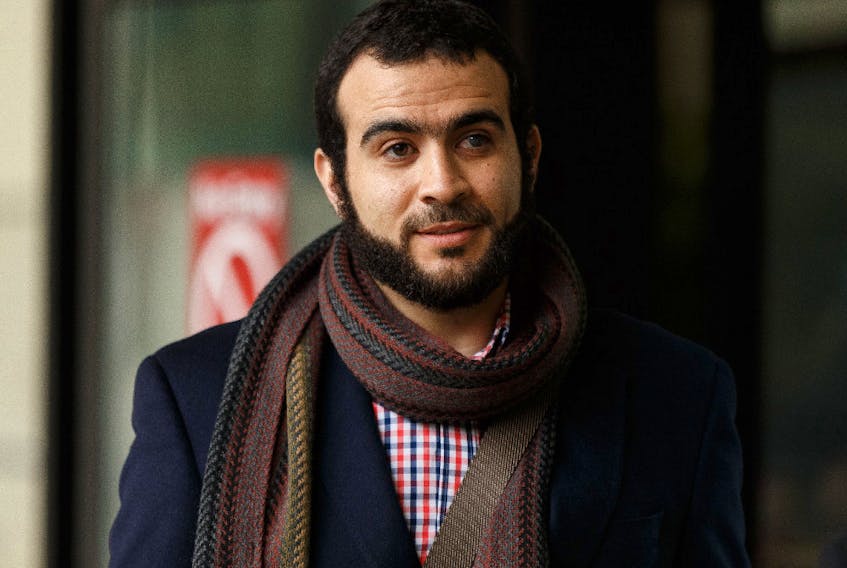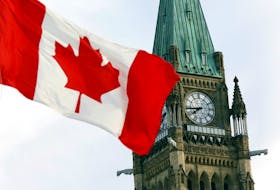OTTAWA — In his first major interview since an Alberta judge ruled his war crimes sentence has expired, a composed Omar Khadr appeared Sunday night on the ferociously popular Quebec talk show Tout le monde en parle.
Walking out to greet the Montreal studio audience in a blue-grey suit jacket, Khadr got a standing ovation, then settled in for a 14-minute chat during which he faced plenty of tough questions from host Guy A. Lepage.
The quintessential Radio-Canada program, Tout le monde en parle regularly attracts more than a million viewers. Its guests are a who’s-who of francophone culture and current affairs, and it is a key venue in which politicians and other public figures — including those from English Canada — try to make an impression on a Quebec audience, risking widespread criticism in the province if their appearance goes poorly.
Khadr, a Canadian citizen, was captured in Afghanistan in 2002 as a 15-year-old, injured by the same firefight in which U.S. soldier Christopher Speer was killed, and held at the infamous Guantanamo Bay prison. In 2010 he was dealt an eight-year sentence after pleading guilty to multiple crimes, including the urder of Speer’s, in front of a since-discredited U.S. military commission.
After being transferred to Canada, Khadr was released on bail in 2015 pending an appeal of his United States conviction. But that process had not moved forward and in late March his sentence, at least in Canada, was ended.
In 2017, Khadr was awarded a more than $10 million settlement from the Canadian government, which the Supreme Court had ruled earlier violated his rights by allowing him to languish at Guantanamo. Meanwhile, a Utah court awarded Tabitha Speer, the widow of the slain soldier, and Layne Morris, another soldier who was injured in the same 2002 firefight, US$134 million in damages from Khadr, a judgment they are still fighting to have recognized in Canada.
Here’s some of what Khadr said in his appearance, which was in English, with French subtitles for Quebec viewers.

On the firefight itself
Asked for his own recollections of the day Speer was killed and he was picked up by American soldiers, Khadr claimed he can’t say for sure how it all happened.
“There’s what I remember, or what I thought I remembered, and then there’s what the evidence was,” he said. “So I, from the time I regained consciousness I was told that I had killed an American soldier, and for the eight years, I believed that I must have done it. Because I was told I was the only survivor and that I had done it, so I believed in that all the way up to the trial. And then I started hearing alternate scenarios and different testimonies. So I can’t tell you exactly what’s the true story.”
My faith has been a very big part of my survival and I've had a lot of good people around me. So I don't want to take any credit for that
Asked whether religious extremists had put him through training exercises while he was in Afghanistan, Khadr said they did. But he hesitated to adopt the “child soldier” label.
“Saying that I was a child soldier would assume that it was a regular war and I was in a regular army,” he said. “I think I was just at an unfortunate place with an unfortunate circumstances, that you know, I was with adults, they told me to do something and I did it. So I don’t know if I would call myself — that’s the term people use to try to describe my situation.”
On what he experienced at Guantanamo Bay
Khadr described how an interrogator told him he was lucky he’d been shot in the firefight, otherwise some of the interrogation techniques could have been worse. Another talk show guest, filmmaker Monia Chakri, asked whether he had experienced solitary confinement. By the Canadian definition of solitary, whereby you can hear or see people but cannot have physical contact with them, the longest stretch was “I think two and a half years at a time,” he said.
Khadr reiterated what he has said time and again in court and in interviews: his guilty plea had come because he saw no other choice. “Unfortunately, in court, in regular court you don’t have to do that but in Guantanamo you have to lose to win. Almost everybody who has been released through the military commission has admitted guilt. So your chance of being released is to admit guilt, and then, you know, come back and fight it in a proper court,” he said. “I don’t regret my decision. I had to do it because I knew I was faced by a process that was set up to fail you.”
On how Canada has treated him
“My roots to Canada have always been there whether I spoke fluent English back then or knew the culture as well as I do today, it didn’t change the fact that my roots were from Canada,” Khadr told Lepage. “I’ve had only good experiences since I’ve been released and Canada has shown the world that it is the country that people wish you could come and live here.”
On finding work
It has been hard to find work, Khadr said, or to get accepted into school where he hopes to study nursing. “A lot of times when I apply for work or volunteering I don’t hear back from people. In the nursing program I applied and of course you have to do a criminal background check and of course when that comes back all the charges come up. So realistically for the time being I don’t think that anybody is going to be willing to risk, like, people like me but are not willing to take that risk to employ somebody with a history as mine.”
Khadr used $3 million of his settlement money to buy an Edmonton strip mall with a lump sum. Some of his tenants later complained they were getting threats as a result. “First thing: It’s not their fault who their landlord is,” he told Lepage. “I met all of them. Their only worry is people who are, as I said, who’ve expressed unkind comments and threats towards them. We’ve notified the police. … I hope that nobody’s going to act upon anything they have said.”
On the government settlement
Lepage asked how Khadr reacts to many people believing him to be a terrorist who should never have received money from the government. “Well, I can’t influence, or I can’t change people’s opinions about me,” he said. “I think this settlement is not only for me, it’s for every Canadian, to a degree, to ensure that our government does not participate in torturing its citizens. So I know some people might be offended by it but I think it’s for all of us.”
On his attitude
At the end of the program, another guest, wheelchair bodybuilder and basketball player Woody Belfort, asked Khadr how he could be so mentally strong. “You seem so zen after everything that’s happened to you. You seem so accepting of life. I’m super-positive, but I know I wouldn’t be where you are right now. And how do you do it?” Belfort said.
“The thing is, I think individuals, they underestimate the willpower that we all have. People think that I’m special, I’m strong. I don’t believe that. I think we all have that capability, it’s just a matter of taking the effort and trusting yourself and believing in yourself and doing it,” Khadr said, adding, “I think you would know.”
Belfort added he saw a strong man in front of him: “You’re amazing.”
Khadr said, “My faith has been a very big part of my survival and I’ve had a lot of good people around me. So I don’t want to take any credit for that.”
• Email: [email protected] | Twitter: mariedanielles
Copyright Postmedia Network Inc., 2019









